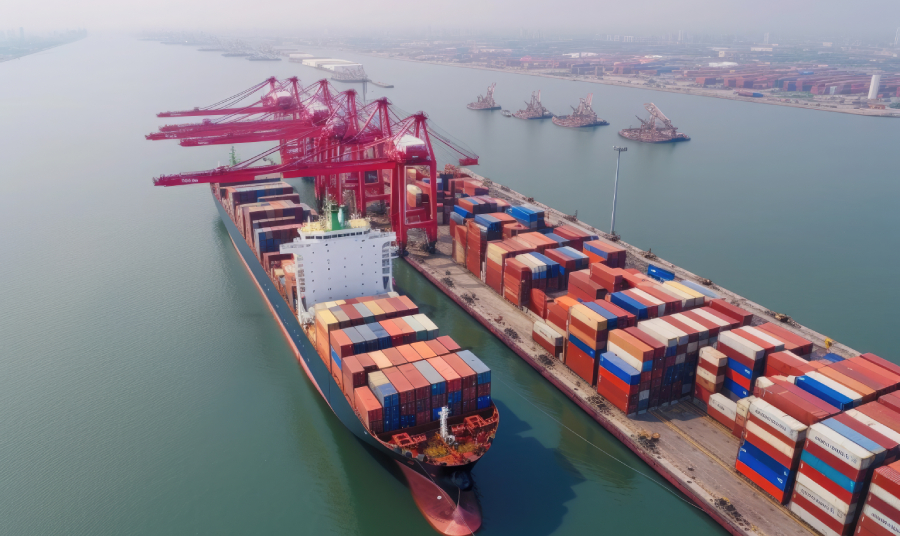Freight Forwarding: A guide for US e-commerce businesses
US-sellers should understand freight forwarding, as using a third-party freight forwarder can help consolidate shipping costs. Here’s Zyla’s guide.

For US-based e-commerce companies with their sights set on global growth, familiarizing yourself with the freight forwarding industry and its various terms will help make the entire shipping process much easier.
Hiring a third-party freight forwarder to handle the more complex aspects of the shipping process (such as the Bill of Lading terms and consolidating shipments) will save you time and money, allowing you to focus on sourcing the best goods from manufacturing hotspots like China, and boosting customer satisfaction scores.
In this guide, we’ll take you through some frequently asked questions about freight forwarding, including what the complicated process entails and how to find the ideal freight forwarder for your unique business needs.
What is freight forwarding?
Freight forwarding is a service industry that helps businesses ship large quantities of goods. Freight forwarding companies act as intermediaries between businesses and shipping companies, handling various responsibilities from customs clearance to transportation documentation (also known as Bill of Lading or BOL).
The service is designed for products bought in bulk, as opposed to small or single shipments, as it’s a more cost-effective method for moving goods from point A to point B. Therefore, one of the main benefits of using freight forwarders is that they can help businesses consolidate their shipments and negotiate better shipping rates.
‘Freight’ refers explicitly to products too large or heavy to be sent via conventional mail services. Each freight forwarding company uses different criteria to categorize goods eligible for freight forwarding, but they typically refer to shipments larger than 30 inches by 30 inches by 30 inches and weighing over 49 pounds.
It’s important to note that freight forwarding doesn’t directly refer to transporting the goods, but instead getting someone else to arrange that transport on the e-commerce seller’s behalf.
What is a freight forwarder?
A freight forwarder plays a central role in e-commerce supply chain management, acting as the freight broker (or intermediary) between sellers, shipping, airline, rail, or road haulage companies.
Aside from arranging transport, freight forwarders will ensure the correct HS codes and Incoterms are used for customs paperwork. They also provide insurance options or offer troubleshooting for shipments that have been delayed at the border.
Companies like DHL Global Forwarding, DSV, and Kuehne+Nagel are notable examples of freight forwarders that orchestrate seamless shipping from countries like China to the US daily.
What are the different types of freight forwarding?
There are four main types of freight forwarding services, including:
Ocean Freight Forwarding: Shipping goods by sea is one of the most common types of freight forwarding, as ocean freight charges can be the most affordable for e-commerce sellers. However, it can be a slow process.
Air Freight Forwarding: This type of freight forwarding is the fastest method of transporting bulk quantities of goods. However, it can also be one of the most expensive modes of transport.
Ground Freight Forwarding: Freight forwarders will arrange the transport of goods by trucking companies or trains. This can be a good option for US-based e-commerce sellers sourcing goods from manufacturers in North America.
Multimodal Freight Forwarding: This freight forwarding method uses various forms of transport to ship goods. For instance, a shipment from overseas may arrive by boat before being transferred from the port by train or fleet of trucks to reach its final destination. It can be a good option for companies shipping perishable goods, which may be difficult to send via one mode of transportation only.
In addition to the four main shipping methods, some freight forwarding companies specialize in hazardous or temperature-controlled goods. So, it’s always best to compare modes of transportation and providers to ensure your freight forwarder meets your fulfillment requirements.
How does freight forwarding work?
For online sellers, the freight forwarding process works as follows:
1) Seller selects a suitable freight forwarder: Consider aspects such as supplier location, the type of goods the freight forwarder specializes in, and the cost of freight transportation.
2) Get a quote from the freight forwarder and tell them your needs: Provide the company with the country of origin of your shipment, information about your goods, your desired delivery date, and your budget. The freight forwarder will give you a quote covering the freight charges, plus customs duties and any other applicable fees. They can also put you in touch with cargo insurance companies that protect your goods from loss or damage.
3) Book your shipment and prepare your goods: Once you have accepted a quote, book your delivery and prepare your goods for transit. If you are importing goods from overseas, contact your suppliers and ensure that your products are packed and appropriately prepared for transportation. In the meantime, the freight forwarding company will plan the most efficient shipping route, prepare the correct documentation and utilize its logistics network to ensure delivery accuracy.
This list of documents may include:
- Commercial invoice: Containing shipper, consignee, and value of goods information
- Packing list: Additional shipment details, including the shipment’s dimensions, weight, and product type
- Certificate of origin: Required for importers, this document certifies the location of the goods being shipped
- Bill of lading (BOL): The agreed terms of the shipment between the shipper and carrier
- Export/Import declaration: These documents provide US Customs and Border Protection (CBP) with information about the shipment for clearance into the US
- Special permits: Including declaration of dangerous goods for hazardous materials (if applicable)
- Freight Insurance coverage certificate: If applicable – although it’s highly recommended
4) Track your shipment: The freight forwarder will provide you with a freight tracking number so you can locate your shipment throughout the transportation process. They will handle the shipping, customs documentation, and requirements for clearance to avoid delays.
5) Receive your shipment and pay your freight forwarder: When your international shipment arrives at its destination country, your freight forwarding company will inform you so you can collect your shipment or deliver it to your desired location. From there, you can settle the bill using an international payment service like Zyla.
The difference between freight forwarding and logistics
Logistics providers offer a more comprehensive list of services and can be a great asset for expanding a business internationally. For instance, they can support sourcing, international shipping, and storing your products.
On the other hand, while international freight forwarders are still very useful, these companies are only concerned with the shipping aspect of the logistics cycle.
Pay international freight forwarding companies quickly and securely with Zyla
Navigating the complex world of logistics involves collaborating with businesses worldwide, which brings challenges. For example, currency conversion costs will impact your supply chain services budget, so you need to use an international payment service offering competitive rates on exchange.
Here at Zyla, we understand the intricacies of international supply chain management and can help you simplify the process of expanding your e-commerce company’s global reach.
By opening a Zyla Account with us, you can make fast and secure payments to freight forwarding companies worldwide, helping you expedite the process. Our rates are also more competitive than mainstream banks, and no charge or minimum deposit is required to keep your account open.
You can also hold multiple currencies in your Zyla Account, enabling you to make payments or repatriate funds into USD when the exchange rate serves you most.
For more information, sign up for a Zyla Account here or call us at (855) 797-3366.



